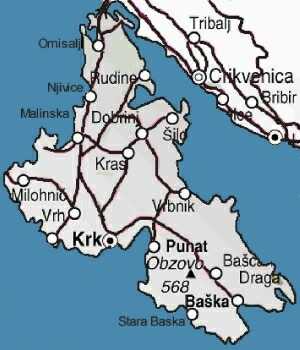Dubašnica on:
[Wikipedia]
[Google]
[Amazon]
 Dubašnica () was a village in the northwestern part of the island of
Dubašnica () was a village in the northwestern part of the island of
 Dubašnica () was a village in the northwestern part of the island of
Dubašnica () was a village in the northwestern part of the island of Krk
Krk (; ; ; ; archaic German: ''Vegl'', ; ) is a Croatian island in the northern Adriatic Sea, located near Rijeka in the Bay of Kvarner and part of Primorje-Gorski Kotar county. Krk is tied with Cres as the largest Adriatic island, depending o ...
, now in Croatia
Croatia, officially the Republic of Croatia, is a country in Central Europe, Central and Southeast Europe, on the coast of the Adriatic Sea. It borders Slovenia to the northwest, Hungary to the northeast, Serbia to the east, Bosnia and Herze ...
, at the south of Malinska
Malinska () is a settlement (naselje) in the northwestern part of the island Krk in Croatia and an important tourist town. It lies on the coast of the Adriatic Sea, in the picturesque bay facing Opatija and Rijeka.
Demographics
The municipality o ...
and near Poljica. It was first mentioned in the 15th century and became extinct in the 18th century as a result of a malaria
Malaria is a Mosquito-borne disease, mosquito-borne infectious disease that affects vertebrates and ''Anopheles'' mosquitoes. Human malaria causes Signs and symptoms, symptoms that typically include fever, Fatigue (medical), fatigue, vomitin ...
epidemic
An epidemic (from Greek ἐπί ''epi'' "upon or above" and δῆμος ''demos'' "people") is the rapid spread of disease to a large number of hosts in a given population within a short period of time. For example, in meningococcal infection ...
. For centuries, Dubašnica was the seat of a municipality that grouped several villages in the region, but after its disappearance, the seat was moved to Bogovići and later to Malinska. Today, this municipality is known as Malinska-Dubašnica
Malinska-Dubašnica is a municipality in the Primorje-Gorski Kotar county on the island Krk of in western Croatia. Its centre is Malinska. There were 3,212 inhabitants, of whom 90% were ethnic Croats at the 2021 census. It was established as a mun ...
, and although its capital
Capital and its variations may refer to:
Common uses
* Capital city, a municipality of primary status
** Capital region, a metropolitan region containing the capital
** List of national capitals
* Capital letter, an upper-case letter
Econom ...
is still Malinska, it retains Dubašnica in its name. Nowadays, Dubašnica may also refer to a region made up of all these villages constituting the municipality of Malinska-Dubašnica.
The areas of Dubašnica and Poljica, as well as the land between the castles of Dobrinj
Dobrinj is a village and municipality in the Primorje-Gorski Kotar County in northwestern Croatia, on the island of Krk. There are 2,150 inhabitants in the municipality, with 91% Croats. The village of Dobrinj itself has 89 inhabitants.
Geography ...
and Omišalj, were settled by Vlachs
Vlach ( ), also Wallachian and many other variants, is a term and exonym used from the Middle Ages until the Modern Era to designate speakers of Eastern Romance languages living in Southeast Europe—south of the Danube (the Balkan peninsula ...
and Morlachs
Morlachs ( sh-Latn-Cyrl, Morlaci, Морлаци; ; ) is an exonym used for a rural Christian community in Herzegovina, Lika and the Dalmatian Hinterland. The term was initially used for a bilingual Vlach pastoralist community in the mountain ...
(Romanians
Romanians (, ; dated Endonym and exonym, exonym ''Vlachs'') are a Romance languages, Romance-speaking ethnic group and nation native to Central Europe, Central, Eastern Europe, Eastern, and Southeastern Europe. Sharing a Culture of Romania, ...
) during the second half of the 15th century. This was due to the need for more manpower by Ivan VII Frankopan, prince of the Principality of Krk since 1451. These Romanians, who originally were shepherd
A shepherd is a person who tends, herds, feeds, or guards flocks of sheep. Shepherding is one of the world's oldest occupations; it exists in many parts of the globe, and it is an important part of Pastoralism, pastoralist animal husbandry. ...
s, would end up diverging into Istro-Romanians
The Istro-Romanians ( or ) are a Romance languages, Romance ethnic group native to or associated with the Istria, Istrian Peninsula. Historically, they inhabited vast parts of it, as well as the western side of the island of Krk until 1875. Howe ...
and would form a community on the island with their own dialect, called by some Croatian scholars as "Krko-Romanian", which ended up influencing the local Croatian dialect of the region. The last speaker of the Istro-Romanian dialect of Krk would die in 1875, although Romanian numbering would still be used in the island during the 20th century.
References
Krk Former populated places in Croatia Geography of Primorje-Gorski Kotar County Regions of Croatia {{PrimorjeGorskiKotar-geo-stub